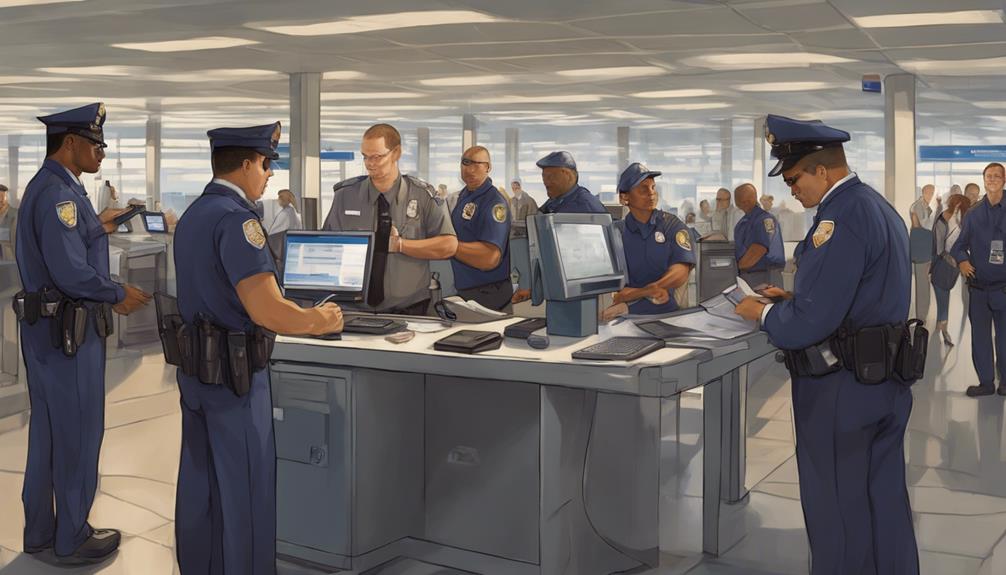Background checks for passports are essential for security and eligibility. Authorities review criminal backgrounds, warrants, and convictions. Felons may face travel restrictions based on their criminal history. The process involves thorough screening using FBI and Interpol databases. Shared resources enhance security checks for applicants. Passport numbers play a vital role in tracking travel history. Criminal convictions, especially related to drugs or sex offenses, greatly impact passport applications. Ensuring compliance with legal requirements is crucial.
Key Takeaways
- Passport applications undergo thorough criminal background checks.
- Verification of warrants, convictions, and outstanding arrest warrants is standard.
- Collaboration with FBI and Interpol databases ensures detailed vetting.
- Active felony warrants or trials can result in application denial.
- Security measures include checking for criminal history and legal compliance.
Passport Application Requirements

During passport applications, individuals must meet specific requirements to guarantee eligibility and security. One important aspect of these requirements is the criminal background check conducted to establish the safety and integrity of the passport issuance process.
These background checks aim to verify the applicant's identity, citizenship status, and any potential criminal history. Documents like birth certificates and naturalization certificates are scrutinized for authenticity to establish eligibility for a passport. Additionally, authorities review warrants, outstanding arrest warrants, and criminal convictions to assess the applicant's suitability for holding a passport.
If there are unresolved legal issues, active felony warrants, or ongoing criminal trials, the passport application may be denied. To conduct thorough checks, the FBI and Interpol databases are consulted to obtain a detailed overview of the applicant's criminal background history.
Travel Restrictions for Felons
Felons with certain criminal convictions may encounter travel restrictions that can impact their ability to obtain a passport. Travel restrictions for felons are often imposed in cases where there are active felony warrants, ongoing legal proceedings, or convictions related to drug trafficking, national security, or treason. Additionally, outstanding child support payments or federal debts can also prevent felons from acquiring a passport.
Certain countries, such as Canada, may restrict entry for individuals with a criminal history, further complicating international travel plans for felons. It's essential for individuals with a criminal record to seek legal advice to fully understand the extent of their travel restrictions.
In cases where a passport application is denied due to criminal history, exploring options for appealing the decision is vital. By being aware of these travel restrictions and seeking proper guidance, felons can navigate the complexities associated with their criminal background and passport eligibility.
Criminal Background Check Process

The criminal background check process for passport applicants involves verifying outstanding arrest warrants and criminal convictions. Accessing databases like the FBI and Interpol helps authorities confirm the criminal history of individuals seeking passports.
Restrictions on passport issuance may apply to those with active felony warrants or ongoing legal issues.
Passport Background Screening
Passport background screening involves verifying criminal records for outstanding warrants, convictions, and legal restrictions using databases like the FBI and Interpol. This process is vital in determining an individual's eligibility for a passport. Authorities access these databases to check for felony convictions, active warrants, or unresolved legal issues that could pose security risks.
Local police records and foreign country warrants are also examined to ensure thorough background checks. If an applicant has a history of criminal convictions, especially felonies, their passport issuance may be denied. The presence of active felony warrants or legal restrictions can have a significant impact on the approval of a passport application.
As a result, thorough screening of criminal backgrounds is an essential step in the passport application process to maintain national security and prevent individuals with problematic histories from obtaining travel documents.
Security Measures Implemented
Increased scrutiny on criminal backgrounds for passport applications post-terrorism acts has led to the implementation of enhanced security measures, including thorough criminal background checks utilizing shared databases between federal agencies and local law enforcement. These measures aim to ensure that passport applicants do not pose a security threat due to their criminal history. By accessing databases maintained by the FBI and Interpol, authorities can cross-reference and verify the criminal records of individuals applying for passports. Applicants with outstanding arrest warrants or legal restrictions may be deemed ineligible to receive a passport. The collaboration between federal agencies and local law enforcement agencies enables a comprehensive assessment of an applicant's criminal background, helping to maintain the integrity and security of the passport issuance process.
| Security Measure Implemented | Details |
|---|---|
| Database Access | FBI and Interpol databases checked |
| Eligibility Criteria | No outstanding warrants allowed |
| Collaboration | Between federal and local agencies |
| Purpose | Ensure applicant security |
Database Sharing for Security Checks
Access to shared databases enables authorities to conduct in-depth security checks for passport applicants, ensuring a detailed vetting process. By sharing databases between agencies like the FBI and local law enforcement, passport issuing authorities can quickly access information on criminal convictions, outstanding warrants, and other pertinent background check details. This collaboration allows for a thorough review of an individual's history, including any interactions with law enforcement that may raise security concerns.
The ability to tap into various databases not only enhances the efficiency of the background check process but also broadens the scope of information available to decision-makers. Homeland security leverages these shared resources to verify the authenticity of documents provided during the passport application process and to cross-reference details against multiple government databases.
Moreover, the inclusion of international databases in these security checks ensures that active warrants from foreign countries are also considered, enhancing the overall security measures in place for passport issuance.
Importance of Passport Numbers

Passport numbers serve as important identifiers for tracking issuance and travel history, aiding in verifying identity and citizenship.
Safeguarding these numbers is essential to prevent identity theft and fraud, playing a significant role in maintaining personal information security.
Passport Number Security
For international travelers, the security of passport numbers is paramount due to their role as unique identifiers in tracking issuance and travel history.
Passport numbers are crucial for identity verification, aiding in border security measures. Safeguarding passport numbers is essential to prevent identity theft and misuse, as they serve as distinctive markers for individuals during international travel.
While passport numbers aren't typically checked for criminal backgrounds during the application process, they play a significant role in immigration procedures and maintaining accurate travel records.
It's important for travelers to keep their passport numbers confidential and secure to avoid potential risks associated with identity fraud. Any unauthorized access to passport numbers can lead to serious consequences, making it imperative for individuals to handle this sensitive information with care.
Tracking Travel History
Tracking travel history is vital in understanding an individual's movement patterns and verifying their identity and citizenship. Passport numbers play an essential role in this process by serving as unique identifiers that allow authorities to monitor passport issuance and travel patterns.
By linking passport numbers to specific individuals, countries can enhance border security and immigration control measures effectively. These numbers aren't only necessary for tracking an individual's past travels but also for confirming their citizenship status when entering or exiting a country.
Safeguarding passport numbers is of utmost importance to prevent identity theft and misuse, as they hold sensitive personal information. While passport numbers aren't typically used for background checks on social media activity during the application process, they remain a fundamental tool for verifying an individual's identity and travel history across different countries.
Social Media and Passport Applications
While social media activity isn't typically checked during passport applications, potential implications for security measures should be considered. Passport issuance primarily focuses on verifying identity, citizenship, and criminal background to confirm the authenticity of the applicant. Personal information security is maintained throughout the application process to safeguard against identity theft.
Despite the minimal emphasis on social media during passport applications, there are concerns about the security risks associated with the information shared online. Although current procedures prioritize official documents and background checks, the possibility of utilizing social media as an additional verification tool could enhance security measures.
To prevent fraud or misuse of passport information, authorities may contemplate incorporating social media checks in the future. By integrating social media monitoring into the application process, officials could potentially strengthen the overall security framework surrounding passport issuance.
While not currently a standard practice, the evolving landscape of technology and security may prompt adjustments to include social media scrutiny in passport application procedures.
Legal Factors in Passport Denials

Passport denials can occur due to various legal factors, such as active felony warrants or ongoing trials that may impact the application process. Individuals with an outstanding criminal record, including charges related to drug trafficking, money laundering, or illegal passport use, may face rejection when applying for a passport.
Additionally, failure to pay child support or federal debts can also result in the denial of passport applications. These legal issues raise concerns about the individual's compliance with the law and their potential risk factors for international travel.
Furthermore, special legal circumstances, such as certain criminal convictions, can further complicate the passport acquisition process. It's essential for applicants to address any outstanding legal matters and guarantee compliance with legal requirements to enhance their chances of a successful passport application.
Legal factors play a significant role in the decision-making process for passport approvals, emphasizing the importance of maintaining a clean legal record.
Impact of Criminal Convictions
Criminal convictions greatly influence the outcome of passport applications, particularly in cases involving felony drug charges or money laundering convictions. Any active felony warrants or ongoing trials can lead to denied passport applications.
Charges related to illegal drug activities or misuse of a passport also result in passport denial. It's important to mention that even if time has elapsed since a conviction, there's no guarantee of passport approval, especially for serious offenses.
For example, sex offense convictions necessitate a unique marking on passports under International Megans Law. These strict measures underscore the significance of criminal history in passport application reviews.
Individuals with a felony charge related to drugs or financial crimes should be prepared for potential passport denials based on their criminal background, as these factors heavily impact the passport approval process.
Drug-Related Charges and Passports

Facing felony drug charges presents a significant obstacle to obtaining a passport. While misdemeanor drug charges typically don't impede passport applications, felony charges related to drug offenses can complicate the process.
It's important for individuals seeking passports to make sure that their drug-related charges don't violate federal drug laws, as this could result in denial. Additionally, using a passport for illegal drug activities or being involved in money laundering schemes related to drug offenses can also lead to the rejection of a passport application.
The U.S. Department of State takes drug-related charges seriously when reviewing passport applications. Individuals with felony drug charges on their record must address these issues before applying for a passport to improve their chances of approval.
It's crucial to understand the implications of drug offenses on passport eligibility and take the necessary steps to rectify any legal issues before submitting an application.
Addressing Sex Offender Convictions
Individuals convicted of certain sex offenses may have their passports marked to alert authorities. This marking is mandated by the International Megan's Law for sex offense convictions. The presence of such a marking can result in restrictions on international travel for the individual.
While passport denial isn't automatic for those with sex offense convictions, their applications are subject to heightened scrutiny. Traveling internationally with a sex offense conviction can present unique challenges and limitations. It's essential for individuals with such convictions to be aware of the potential consequences on their ability to travel abroad.
The marking on passports serves as a cautionary measure for authorities to monitor the movements of individuals with sex offender convictions. As a result, those with such markings may encounter obstacles and increased monitoring when attempting to travel internationally.
Frequently Asked Questions
Is There Anything That Disqualifies You From Getting a Passport?
Certain criminal convictions like drug trafficking, child support debts, and treason can disqualify individuals from getting a passport. Active felony warrants, ongoing trials, or being on probation can lead to application denials. Other legal restrictions may apply.
Can You Get a Passport if You Owe Taxes?
Yes, you can obtain a passport if you owe taxes. However, unpaid federal taxes could lead to application denial or revocation. Resolving tax debts is essential to prevent passport-related issues. Consult with a professional for guidance.
How Do I Check My Passport Background?
To check their passport background, individuals can contact the State Department for information on their application status. Background checks for passports involve verifying identity, citizenship, and potential criminal history to guarantee security and compliance.
Is a Passport Enough for a Background Check?
A passport is not sufficient for a detailed background check. Background checks for passports involve verifying criminal history, warrants, and legal restrictions. They access FBI and Interpol databases but do not typically include social media scrutiny.
What Information Do Background Checks for Passports and TSA Background Checks Include?
When it comes to tsa background checks passengers, background checks for passports and TSA include a thorough review of an individual’s criminal history, watchlist status, and immigration status. This information helps to ensure the safety and security of air travel by identifying any potential threats or risks posed by passengers.
Conclusion
To sum up, while background checks aren't typically performed for passport applications, certain criminal convictions can impact the application process. Despite this, individuals with criminal histories should still apply for passports, as each case is considered on an individual basis.
It's important for all individuals to have the opportunity to travel and explore the world, regardless of their past mistakes.









